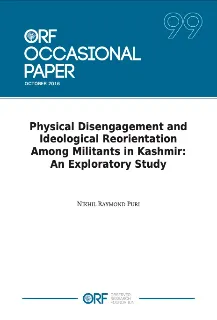Since militancy began in the Kashmir Valley in the late 1980s, thousands of young men have joined and energised the violent campaign against the Indian state—and eventually moved away from it. Yet their stories remain largely untold, and while the subject of terrorist disengagement is relatively well-studied in many other conflict zones across the world, Kashmir’s sizeable contingent of former militants has managed to elude scholarly attention. This study attempts a first step towards filling this gap, exploring how and why former militants in Kashmir “left militancy behind.”
In order to present a diverse set of narratives, this study visits six former militants in the Kashmir Valley. It uses semi-structured interviews to capture the factors that prompted them to join militancy, the nature of their involvement, and the circumstances around their disengagement. Taking a cue from current literature, this study is careful to disaggregate the concept of ‘disengagement’ into its physical and psychological components. If physical disengagement represents an individual’s observable – albeit, often non-linear – transition from militant to former militant status, psychological disengagement involves a less tangible process of ideological reorientation.
The study also recognises that physical disengagement can occur involuntarily, as a consequence of arrest, but also voluntarily, as when individuals withdraw of their own volition. The paper opens with a discussion of the methodology employed in the study. It justifies the use of a small-N case study method to explore the experiences of individual respondents, acknowledges the shortcomings of this approach, delineates the scope of the study, and briefly describes the interview sample and the manner in which it was selected. The second part proceeds to ask how and why Kashmiri combatants – who once signed up readily for the effort to violently disturb the status quo – walked away from militancy. It focuses on the personal stories of six former militants, including of their disengagement. (In order to protect their identities, this paper refers to its interviewees using pseudonyms).
This section explores their motivations for joining militancy, the conditions in which they operated as active militants, and the details of their eventual exit. This narrative section attends closely to the interplay between the physical and psychological aspects of disengagement, analysing how the militant’s commitment to the ’cause’ and its violent pursuit evolved during and after involvement in the struggle. In tracking the individual militant’s ideological reorientation, this section also pays careful attention to the shifting targets of one’s disaffection. If young men in the Valley started their journeys with purely anti-India mindsets, might the subsequent ‘shortcomings’ of other actors – an irredentist Pakistan and a domestic separatist leadership – have induced them to re-direct some of their disaffection towards these entities? The paper closes by presenting key lessons that emerge from the narrative section, and discusses measures that can be taken by the Indian state to manage discontent and its violent expressions in an increasingly dynamic environment.

 PDF Download
PDF Download



 PREV
PREV

